Introduction
Despite the intimidating nature of chatbot marketing, developing and implementing a chatbot on your homepage and messaging applications is now quick and easy with chatbot platform technologies.
However, in recent years, chatbots have grown in popularity as more and more companies use them to deliver customer service, automate repetitive jobs, and enhance the overall consumer experience.
According to a survey by Grand View Research, the size of the worldwide chatbot market is anticipated to reach USD 1.34 billion by 2024, expanding at a CAGR of 24.3% from 2020 to 2024.
This growth indicates the increasing adoption of chatbots by businesses across various industries.
This blog post will cover all the pros, cons, and use cases of SaaS chatbot. There is a secret platform on this list for everyone, from small business owners aiming to boost customer service to large corporations hoping to turbocharge their marketing.
You will learn about it below, so keep reading it.
What is Saas chatbot?
SaaS stands for "Software as a Service.”
It refers to a method of software distribution in which a consumer may access a software program online while it is hosted by a third-party supplier.
In this model, the software provider is responsible for maintaining the infrastructure and security and updating the software.
At the same time, customers access the application through a web browser or mobile app.
Saas allows businesses to access the software they need without investing in expensive hardware, IT infrastructure, and personnel.
The worldwide chatbot market is anticipated to reach USD 1.34 billion by 2024, rising at a CAGR of 24.3% from 2020 to 2024, according to a research by Grand View Research.
It describes a method of distributing software in which a program is hosted by a third party and made accessible to users online.
SaaS has grown in popularity because to its low cost and flexibility across a variety of business sectors, including customer relationship management (CRM), enterprise resource planning (ERP), & human resource management (HRM).
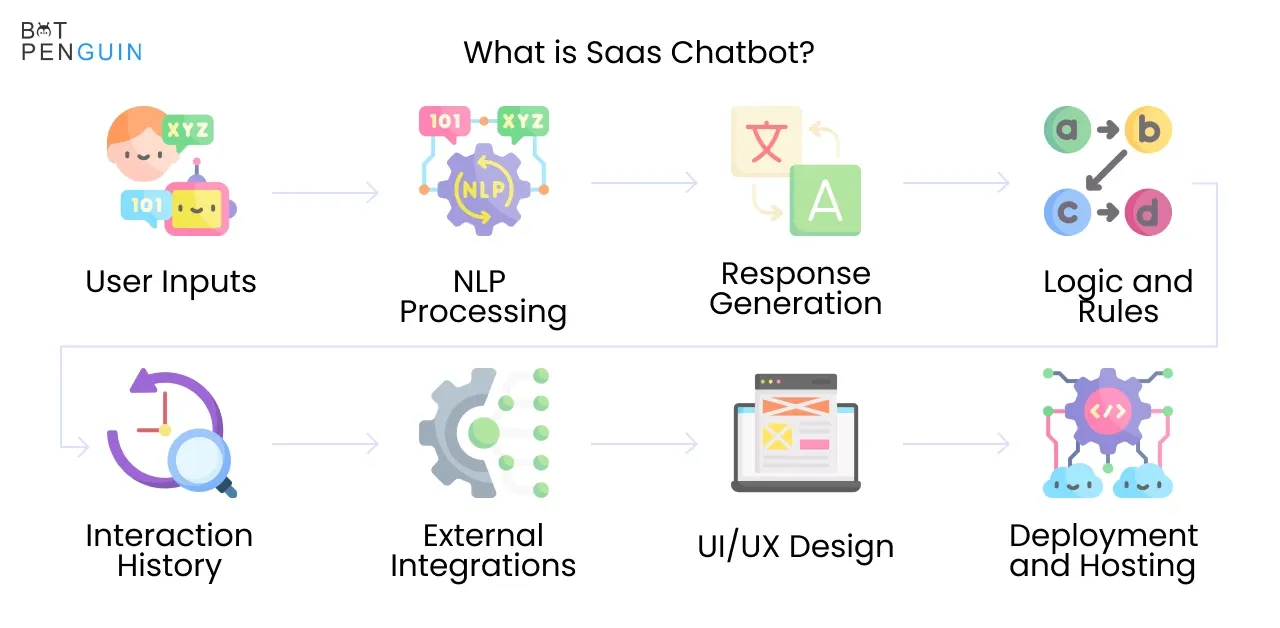
What are chatbots for SaaS?
Chatbots for SaaS (Software-as-a-Service) companies are AI-powered virtual assistants interacting with customers through text or voice.
They can automate routine customer support tasks, such as answering frequently asked questions, resolving common issues, and directing customers to relevant resources.
Chatbots can also collect customer information and provide personalized recommendations, helping to increase customer engagement and satisfaction.
Chatbots can integrate into a company's website, mobile app, or messaging platforms such as Facebook Messenger, WhatsApp, or Slack.
They can operate 24/7 and handle multiple customer inquiries simultaneously, enabling SaaS companies to provide faster and more efficient customer support.
Now, let’s explore the pros, cons, and use cases of SaaS chatbots!
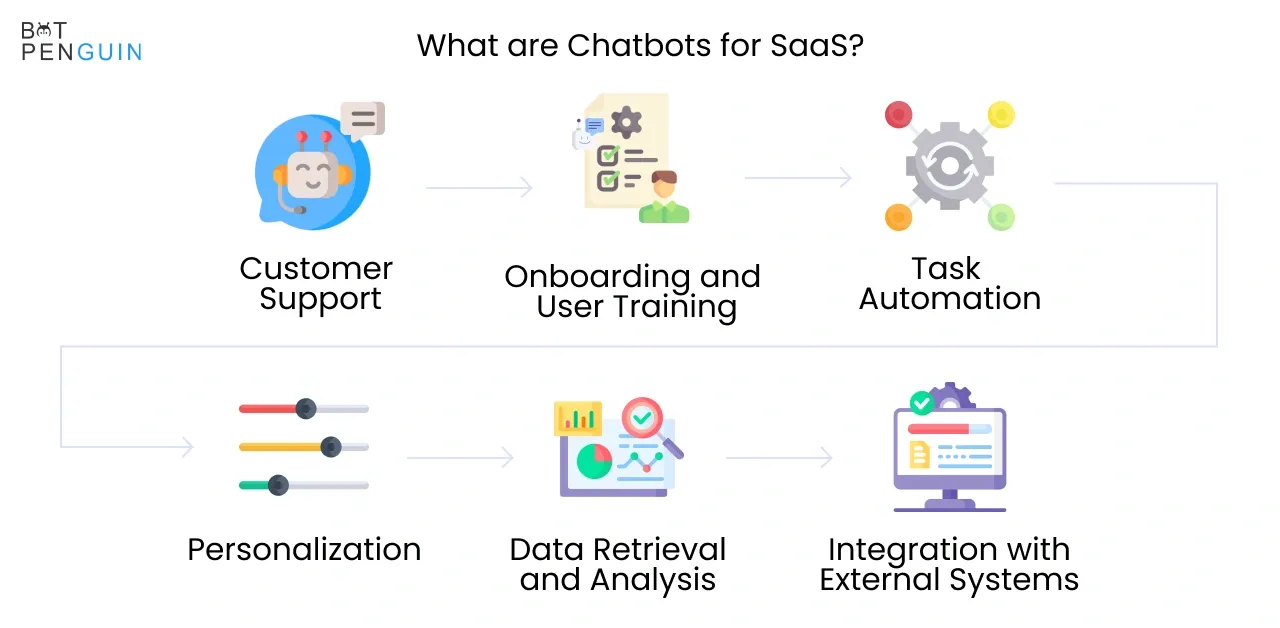
Chatbots for SaaS: Pros
Here are a few pros of using chatbots for SaaS:
Increased Efficiency: Chatbots can handle extensive customer inquiries and respond promptly, leading to increased efficiency and reduced customer wait times.
Cost-effective: Implementing a chatbot can be significantly cheaper than hiring additional customer support staff.
Improved Customer Experience: Chatbots can provide instant assistance and personalized recommendations, improving overall customer experience.
Increased Engagement: Chatbots can collect valuable customer information and provide personalized recommendations, increasing customer engagement.
24/7 Availability: Chatbots can operate 24/7, providing customers with round-the-clock assistance and support.
Scalability: Chatbots can quickly scale to meet a growing business's demands without hiring additional staff.
Integration with Other Systems: Chatbots can be integrated with other systems such as CRM, ERP, and e-commerce platforms, providing a seamless and integrated customer experience.
Improved Insights and Analytics: Chatbots can collect data on customer interactions, providing valuable insights into customer behavior and preferences.
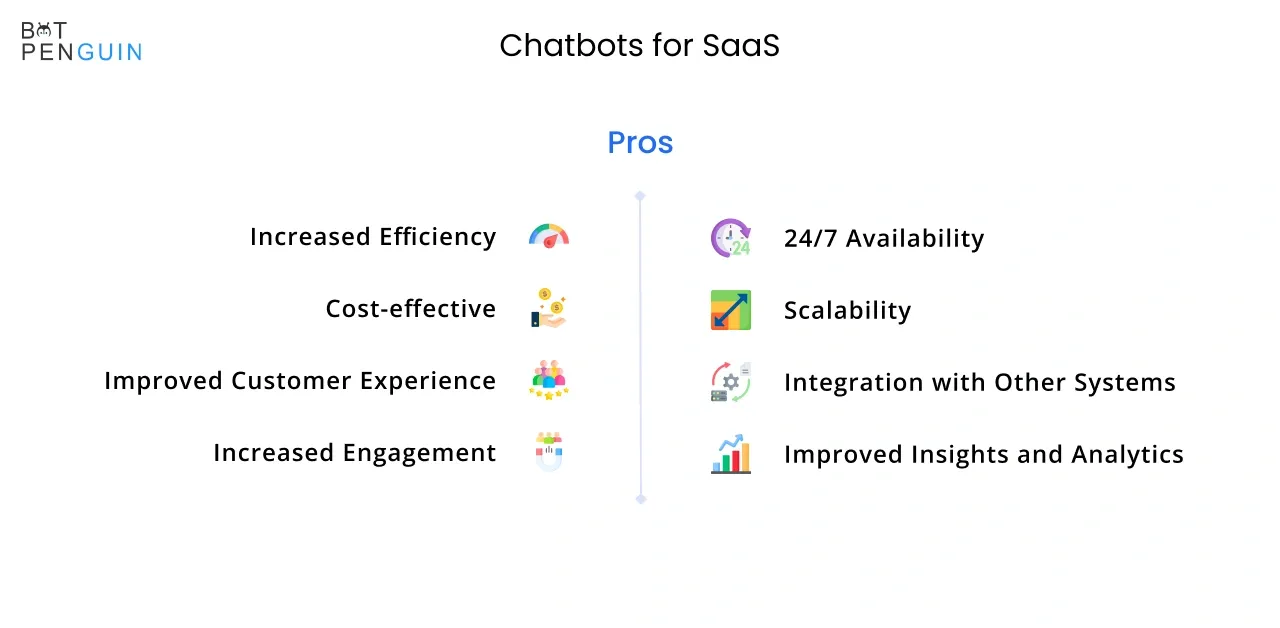
Chatbots for SaaS: Cons
Here are a few cons of using chatbots for SaaS:
Limited Capabilities: Chatbots can only perform small tasks and may need help handling complex customer inquiries.
Technical Glitches: Chatbots may experience technical glitches, leading to incorrect responses and customer frustration.
Lack of Human Touch: There may be a lack of personalization and empathy if certain clients prefer to communicate with live customer service agents.
Potential for Miscommunication: Chatbots may only sometimes understand the intent behind a customer's message, leading to miscommunication and incorrect responses.
Privacy Concerns: Chatbots collect and store customer data, leading to potential privacy concerns and the need for secure data storage.
High Development Costs: A high-quality chatbot may be expensive to develop, especially for companies with tight resources.
Maintenance Costs: Chatbots require ongoing maintenance and updates to remain effective and efficient.
Resistance to Change: Some customers may resist using chatbots, particularly those who need to become more familiar with the technology or prefer human interactions.
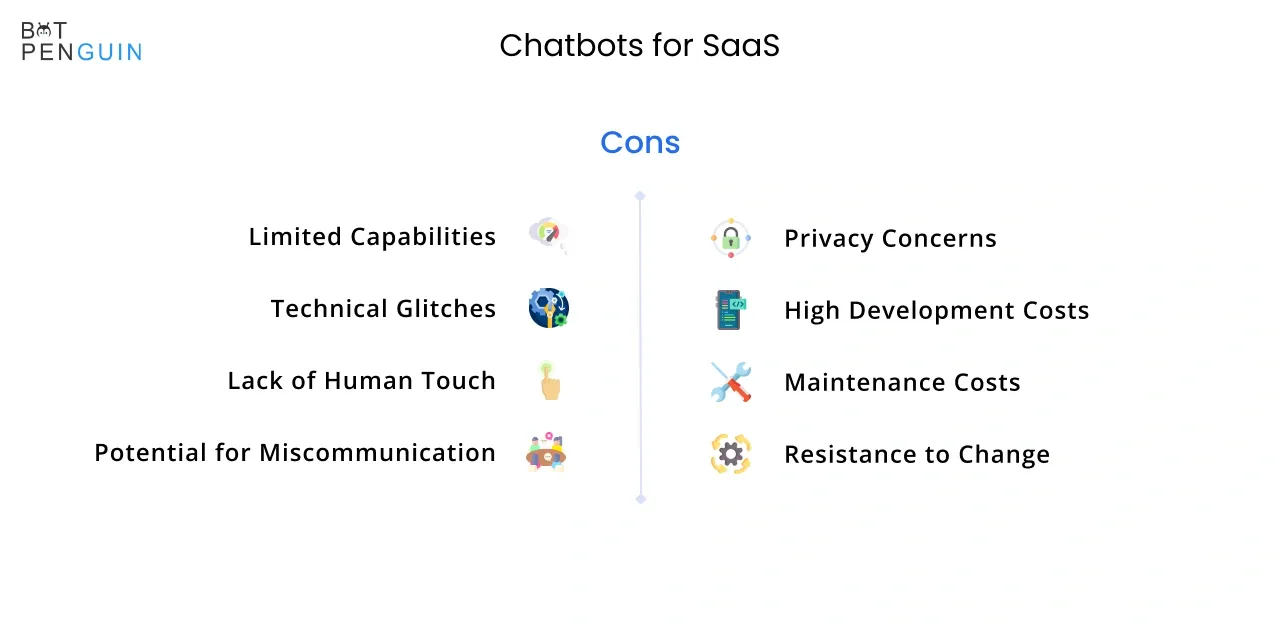
Use Cases for Chatbots in SaaS
Here are some simple use cases for chatbots in SaaS:
Customer Support: Chatbots may automate repetitive customer service duties, including responding to commonly asked queries, fixing common problems, and pointing clients toward valuable resources. Saas chatbot can shorten customer wait times and boost general customer satisfaction.
Lead Generation: Chatbots may interact with potential consumers and learn about their wants and interests, which can assist in creating new leads and business prospects.
Sales Assistance: Chatbots can assist sales teams by providing product information, answering customer questions, and making personalized product recommendations.
Onboarding and Training: Chatbots can guide new users through the onboarding process, providing step-by-step instructions and answering any questions they may have.
Marketing: Chatbots can engage with customers and deliver personalized marketing messages and promotions.
Customer Feedback and Surveys: Chatbots can collect customer feedback and opinions, helping businesses understand customer needs and preferences better.
IT Support: Chatbots can assist IT teams by automatically resolving common technical issues and directing users to the appropriate resources.
HR Assistance: Chatbots can automate HR processes, such as employee onboarding, benefits enrollment, and performance reviews.
Inventory Management: Chatbots can assist businesses with tracking and managing inventory levels, alerting them to low stock levels and helping to ensure they never run out of products.
Accounting and Finance: Chatbots can automate routine accounting and finance tasks, such as invoicing, expense tracking, and financial reporting.
Event Management: Chatbots can manage events, providing information about schedules, locations, and attendees. They used to collect RSVPs and manage the guest list.
Health and Wellness: Chatbots can assist with health and wellness, providing information about nutrition, exercise, and overall fitness. They can also help to track progress and provide personalized recommendations.
E-commerce: Chatbots can be integrated with e-commerce platforms, assisting customers with product recommendations, checkout, and delivery tracking.
Real Estate: Chatbots can assist with real estate transactions, providing information about properties, scheduling viewings, and assisting with buying and selling.
Legal: Chatbots can automate routine legal tasks, such as contract reviews, document preparation, and legal research.
These are just a few instances of how chatbots are used in various businesses and sectors.
Chatbots can significantly improve efficiency and provide valuable insights into customer behavior and preferences by providing instant assistance and automating routine tasks.
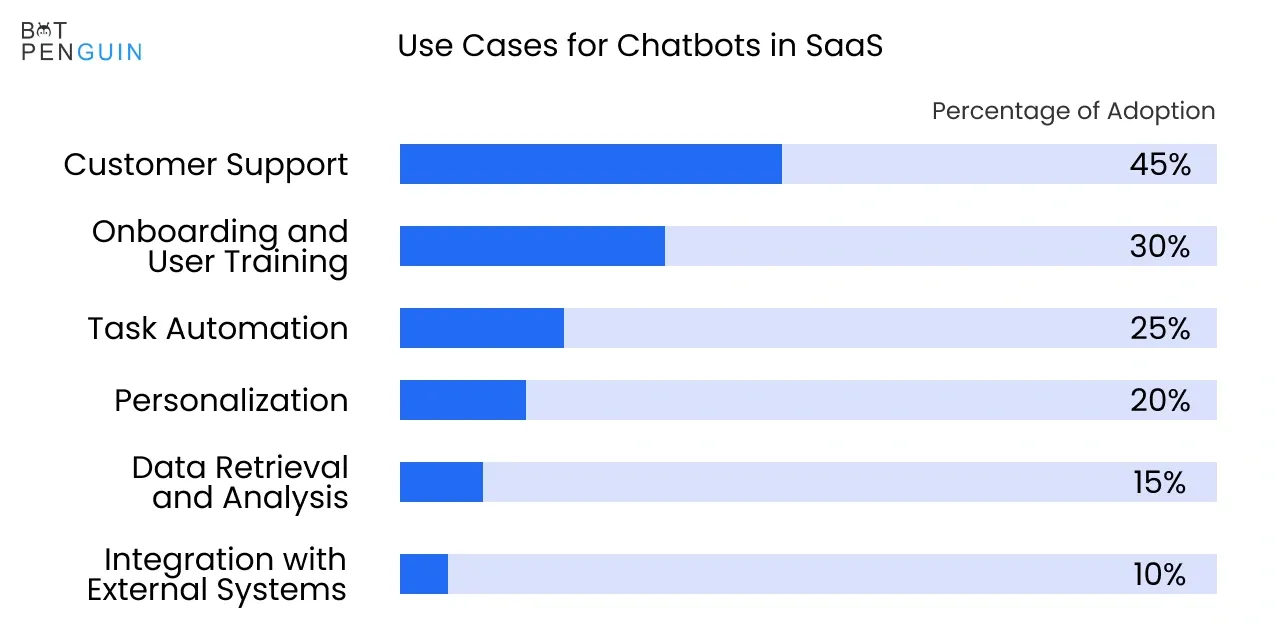
What kind of quality should a SaaS chatbot have?
For a SaaS (Software as a Service) chatbot to be effective, it should have several key qualities:
Natural language processing (NLP): The chatbot ought to be able to comprehend client questions and give helpful human-like responses. This entails being able to deal with slang, syntax, and linguistic variances, as well as being able to identify and answer to typical inquiries and requests.
Contextual awareness: The chatbot should be able to maintain context throughout a conversation and remember important information, such as a customer's previous interactions and preferences.
Personalization: The chatbot should be able to personalize interactions with customers, such as using their names, remembering their previous interactions, and providing recommendations based on their interests and needs.
Speed and accuracy: The chatbot should respond quickly to customer inquiries and provide accurate information. This helps to improve the customer experience and reduce frustration.
Scalability: The chatbot ought to be capable of handling a high volume of client interactions as well as an expanding user base over time.
ntegration: The chatbot should be able to integrate with other systems, such as a company's CRM, knowledge base, and customer data, in order to provide a comprehensive and seamless experience for customers.
User-friendly interface: The chatbot should have a user-friendly interface that is easy to use and understand, with clear and concise responses.
By having these qualities, a SaaS chatbot can help businesses improve their customer support and enhance their overall customer experience.
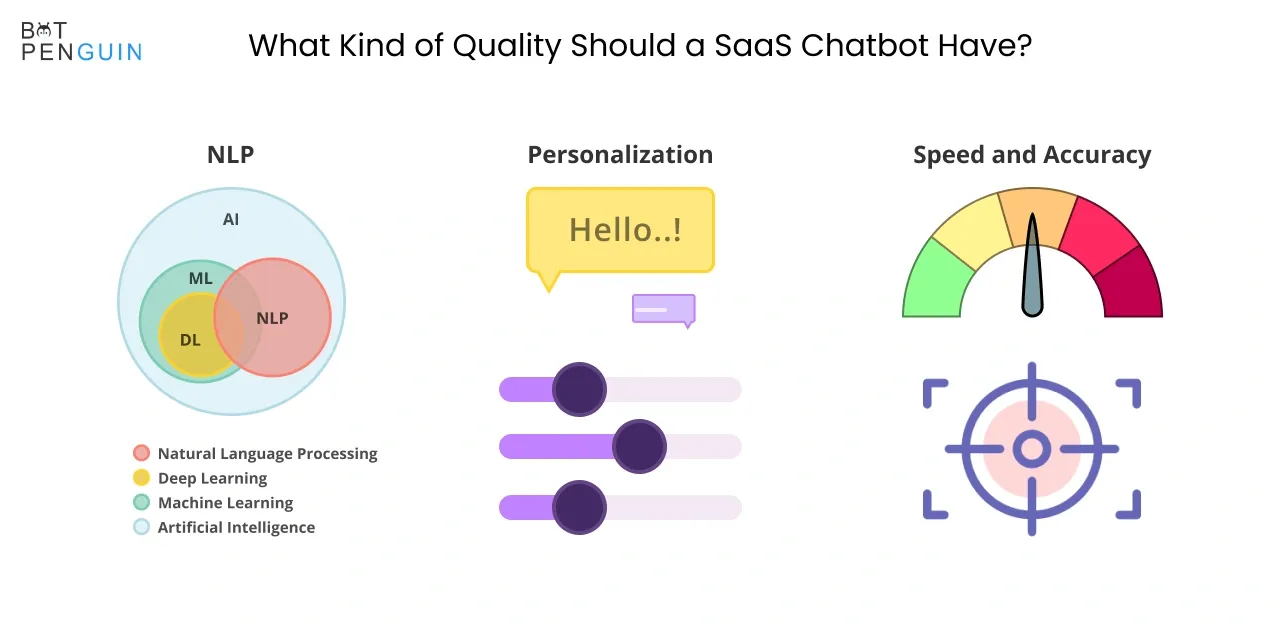
Conclusion
Chatbots for SaaS can provide many benefits for businesses, including improved customer support efficiency, reduced wait times, increased customer satisfaction, and valuable insights into customer behavior and preferences.
With the advancements in artificial intelligence and natural language processing, chatbots have become increasingly sophisticated and capable of handling various tasks, from customer support and sales assistance to HR and IT support.
However, businesses must also consider the limitations of chatbots, including their limited capabilities and potential technical glitches, when deciding whether to implement a chatbot in their SaaS business.
Choosing the right chatbot for your business will require careful consideration of your specific needs.
And this is exactly where BotPenguin comes into play!
BotPenguin chatbots—the ultimate solution for businesses seeking to streamline customer communication and support services.
Our chatbots are built to provide unparalleled customer service, giving you the ability to connect with your clients from all platforms.
Our chatbots are designed to make your life easier, providing quick and efficient responses to your customers' inquiries.
They're also highly customizable, meaning that you can tailor your chatbot to your business's specific needs and brand identity.
So, what are you waiting for? Contact us today!
Frequently Asked Questions(FAQs)
How do chatbots work in SaaS?
Chatbots in SaaS use natural language processing (NLP) and artificial intelligence (AI) to understand and respond to customer inquiries in real time.
They can automate routine tasks, provide instant assistance, and collect valuable customer behavior and preference data.
How do I choose the right chatbot for my SaaS business?
When choosing a chatbot for your SaaS business, consider your business's specific needs and the chatbot's capabilities.
Look for a chatbot that has a proven track record of success, provides excellent customer support, and offers the right balance of features and affordability. And what better option than—BotPenguin!


